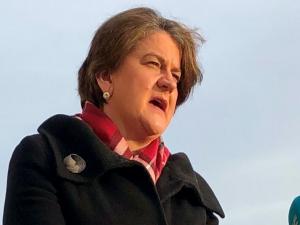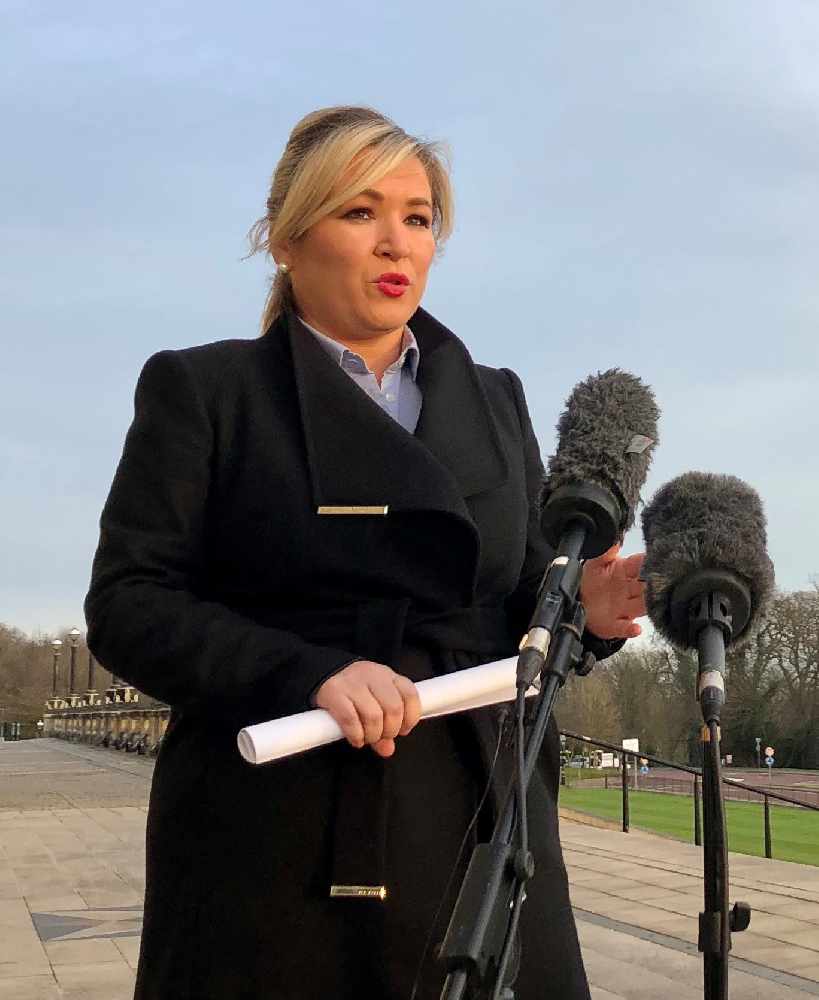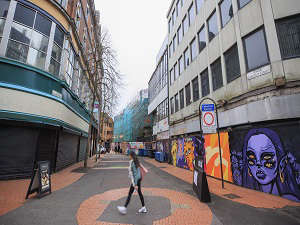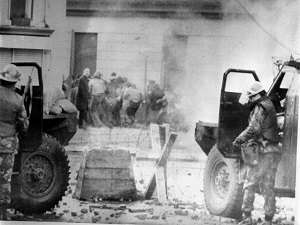
Q Radio News/PA
Northern Ireland’s First Minister said the region has begun a cautious but optimistic journey out of lockdown as she outlined a series of relaxations.
Arlene Foster told the Stormont Assembly that the moves agreed by the powersharing administration were modest but proportionate.
Relaxations announced on Tuesday include a timetable for returning all schoolchildren to classes in Northern Ireland.
They focus on outdoor gatherings and sporting activities as well as click-and-collect services for non-essential retail outlets.
The “stay-at-home” rule is also set to lift next month, replaced with a “stay local” message.
The decisions were made in line with the Executive’s Pathway to Recovery strategy, which was agreed earlier this month.
“To summarise our rationale in one phrase – cautious but optimistic,” Mrs Foster said.
“Small steps along the pathway, with time built in to help us take stock of the impact on the ground.
“Time to reflect, analyse the data and structure the next steps in the Pathway in that context.”
Deputy First Minister Michelle O’Neill welcomed the first steps out of lockdown.
“Today’s decisions are very positive and they represent a gradual and a safe way out of the restrictions,” she said.
“It’s a day of hope for young people, for families, for sports and indeed for businesses.”
Primary pupils in years P1 to P3 are already back in classes and secondary school children in year groups 12 to 14 are due back on Monday March 22.

Michelle O'Neill and Arlene Foster.
Ministers have agreed that remaining primary pupils in P4 to P7 will also return on March 22.
The final cohort, secondary pupils in years eight to 11, will go back to classes on April 12 after the Easter holidays, though this step is subject to an Executive review of the public health picture at the end of March.
In terms of the wider lockdown restrictions, ministers agreed:
From April 1
– Up to six people from no more than two households can meet outdoors in a private garden.
– Ten people, from no more than two households, able to participate in outdoor sporting activities. Golf courses to reopen (clubhouses to remain closed).
– Click-and-collect purchases allowed from garden centres and plant nurseries.
From April 12
– Up to 10 people from no more than two households can meet outdoors in a private garden.
– Click and collect at all non-essential retail outlets.
– “Stay-at-home” requirement lifts. Will be replaced by “stay local” message.
– Outdoor sports training to resume for sports clubs affiliated with recognised governing bodies with no more than 15 participants in one training group. Indoor club facilities, apart from toilets, to remain closed.
The Executive has also amended regulations around elite sports to enable two World Cup qualification matches scheduled for March 25 and 31 to take place as well as a friendly match between Northern Ireland and the US on March 28.
No spectators will be permitted at any sporting event.
The April 12 measures are subject to final ratification by the Executive in the week before they come into effect, likely on April 8.
Mrs Foster outlined the decisions to the Assembly on behalf of the powersharing administration.
The moves were agreed at a virtual Executive meeting earlier on Tuesday.
Mrs Foster referred to the concept of “social contact capital” when explaining that lifting some restrictions meant others had to be kept in place.
She said the Executive had an “amount of decision-making capital which we can afford to spend”.
She said ministers must “spend it wisely” and “in the interests of as many people as possible”.
“If we spend the capital on one easement of restrictions, it can’t be spent on other things at the same time,” she told MLAs.
The First Minister said the executive will “work our way through the restrictions in a careful and managed way at each four-week review point”.
The DUP leader acknowledged that those in the retail sector may be disappointed at the extent of the moves announced.
“To our colleagues in the retail sector we realise that today’s developments are modest and we have a long way to go,” she said.
“We thank you for your forbearance and we recognise that large sections of retail have been on the front line all year. We say thank you as an Executive to everyone who has supplied goods, stocked shelves, served customers and looked after us all over a protracted period of time.”

Deputy First Minister Michelle O'Neill.
Ms O’Neill said ministers had fulfilled the promises made in the lockdown exit strategy.
“We said we’d be gradual, we would be cautious, we’d be sustainable, we’d keep us going in one direction and we believe what we’ve achieved today actually keeps that on track,” she said.
The Sinn Fein vice president said it was understandable that people might be looking at other regions where restrictions were lifting at a quicker pace.
“We set out our plan we said very clearly we only want to go forward, we don’t want to go into reverse, so that’s why we have to be that bit more cautious and gradual,” she said.
Northern Ireland has been living under restrictive lockdown measures since a spike of coronavirus cases in December.
The Executive’s lockdown exit strategy includes five steps along nine pathways – retail; hospitality; education and young people; work; culture, heritage and entertainment; sports and leisure; travel and tourism; worship and ceremonies; and home and community.
The five stages of restriction begin with lockdown then extend to cautious first steps, gradual easing, further easing, and preparing for the future.
The plan does not include any set dates.
The death of one more person who previously tested positive for Covid-19 was confirmed by Northern Ireland’s Department of Health on Tuesday.
Another 164 confirmed cases of the virus were also recorded.
The department’s confirmed coronavirus hospital inpatient number stood at 176 on Tuesday morning, 18 of whom were in intensive care.


 Police launch murder probe following ‘brutal and senseless’ death of woman
Police launch murder probe following ‘brutal and senseless’ death of woman
 More than 5,000 NI children set to spend Christmas in temporary accommodation
More than 5,000 NI children set to spend Christmas in temporary accommodation
 No evidence of police collusion in 1978 La Mon bombing
No evidence of police collusion in 1978 La Mon bombing
 Sex offender who targeted girls online across the UK jailed for 27 years
Sex offender who targeted girls online across the UK jailed for 27 years
 Pre-trial rulings due in Bloody Sunday prosecution of Soldier F
Pre-trial rulings due in Bloody Sunday prosecution of Soldier F